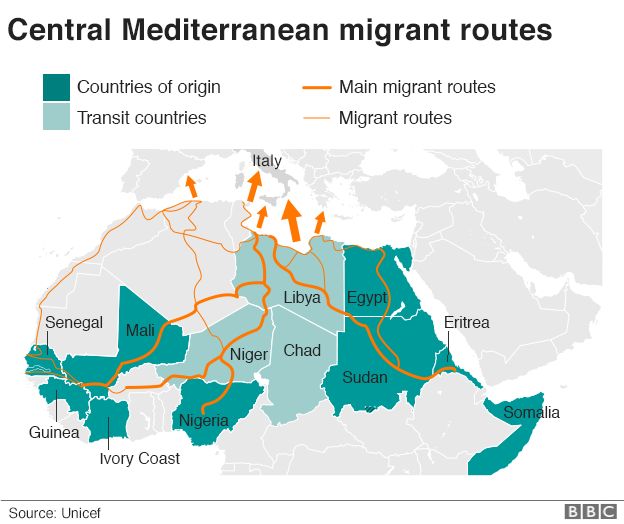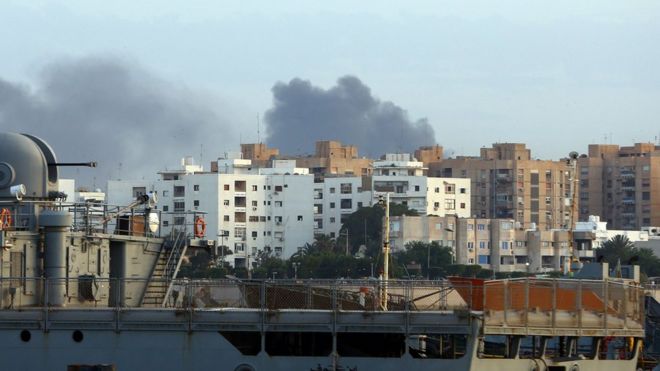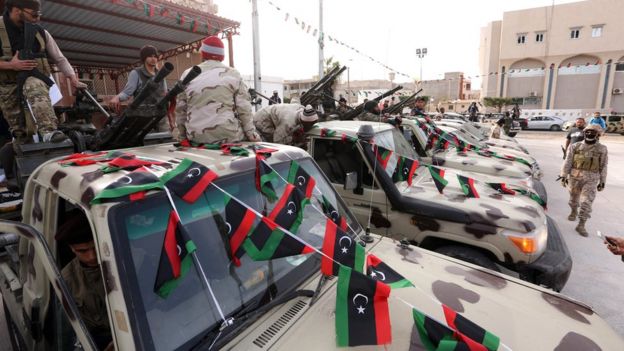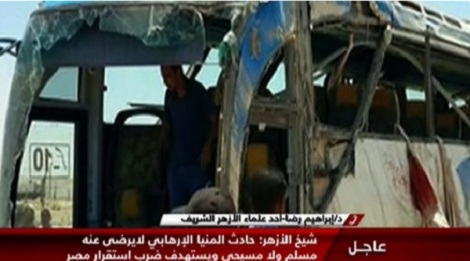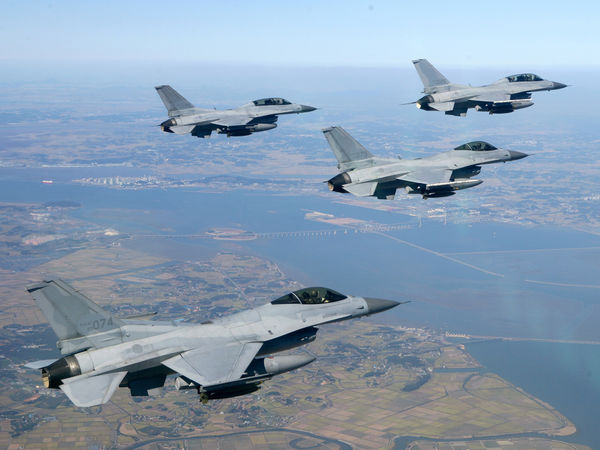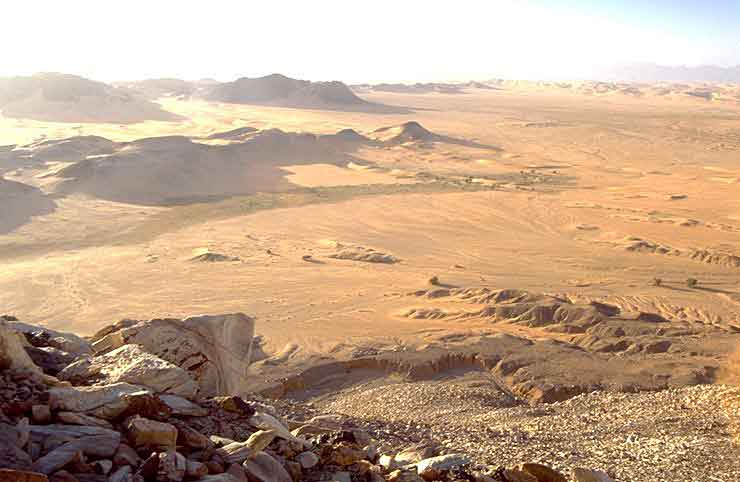Secretary of State Hillary Clinton with Libyan soldiers upon her departure from Tripoli in Libya on October 18, 2011
http://www.telesurtv.net/english/op...ed-as-a-Peoples-Revolution-20170522-0018.html
For the people of Libya, Gaddafi's overthrow has actually meant moving towards oppression and slavery of the most monstrous levels.
When the uprising against the Libyan Jamahiriya broke out in 2011, it was widely considered, especially in the West, to be a popular and democratic revolt against an oppressive and despotic regime with extreme poverty.
The orientalist images of millions of Arabs oppressed by their own government seeking to liberate themselves with the help of the democratic Western nations were propped up, and
grotesque stories such as the claims of the Gaddafi government distributing Viagra pills to soldiers of the Libyan Army were propagated on an enormous level. It was soon found that there was hardly any real basis for such claims. Nevertheless, such stories persisted and new horror stories were fabricated, with the aim of demonizing Colonel Muammar Gaddafi and his rule which lasted from 1969 to 2011.
These narratives helped pave the way towards the overthrow of Gaddafi in October 2011 and the establishment of a highly unstable pro-Western government which has since been dismantled in Libya's second civil war in the 21st Century. Many in the West continue to believe that the new government represents Libya's move away from oppression and slavery. For the people of Libya, however, it has actually meant moving towards oppression and slavery of the most monstrous levels.
The Jamahiriya government, which lasted for over four decades, came about in the wake of a 1969 military coup led by Colonel Gaddafi against the corrupt pro-Western rule of King Idris. The coup saw the overthrow of the King, the abolition of the Libyan monarchy, and the establishment of a new republic with values of social justice and anti-imperialism. Gaddafi at that time was the young 27-year-old figurehead of the "revolution", who realigned Libya towards the Soviet Union and Libya's neighboring pro-Soviet states like Egypt and Syria.
Libya under the leadership of Gaddafi drastically improved the living standards of the Libyan people.
Universal healthcare was available to all of the Libyan population. Average
life expectancy, which was around 55 years in 1969, was over 70 years in 2011 and has not increased since then. The average
literacy rate of Libya reached 91 percent, one of the highest rates of literacy in Africa and comparable to countries in Europe. School enrollment in Libya was also among the highest in Africa.
In 2010, Libya had the highest Human Development Index score in all of Africa, an index used to measure the level of development in every country. Libya had very
low rates of malnourishment, which was under five percent.
Poverty likewise was minimal, with less than ten percent of the population living below the poverty line, which gave Libya one of the lowest poverty rates in Africa and in the world.
Oil production was close to two million barrels per day before 2011 but dropped to less than 400,000 barrels per day afterward.
Having a
highly internationalist and anti-imperialist outlook, the Libyan government sent military assistance to numerous countries and causes, such as the Provisional IRA, Ethiopia, Uganda, Grenada, the Polisario Front in Western Sahara, Palestine Liberation Organization, the Basque ETA, and Nelson Mandela's Umkhonto we Sizwe. Colonel Gaddafi upheld pan-Arabism and pan-Africanism; the African Union was established after the Sirte Declaration of 1999, enacted in Sirte, Libya, the city where
Gaddafi was born in 1942 and murdered in 2011. Gaddafi chaired the African Union from 2009 to 2010. In 2010, he
apologized for the enslavement of black Africans by Arabs, "I regret the behavior of the Arabs… They brought African children to North Africa, they made them slaves, they sold them like animals, and they took them as slaves and traded them in a shameful way. I regret and I am ashamed when we remember these practices. I apologize for this." Gaddafi was one of the most staunch advocates of a pan-continental unity in Africa.
The
civil war in 2011 ended in October of that year with the killing of Gaddafi and the overthrow of his government. The achievements of the Libyan Jamahiriya were destroyed in the resulting period of extreme sectarian violence and
Libya is currently divided between rival governments, tribal forces, and affiliates of the Islamic State. An attack on the U.S. diplomatic mission in the city of Benghazi by the Ansar al-Sharia group in September 2012 resulted in a major political scandal in the United States.
Black Libyans and migrants from sub-Saharan African countries, in particular, have been brutally attacked by militias that helped overthrow the Libyan government in 2011. Many were
scapegoated as mercenaries hired by Gaddafi and subject to violence from the rebels.
Kidnappings, beatings, lynchings and acts of ethnic cleansing have been reported; the black-majority city of Tawargha was depopulated by anti-Gaddafi forces and became a ghost town. Black Libyans, as well as migrants, have been sold into slavery. With the stable and popular Jamahiriya overthrown, it is certain when and under what circumstances that the ongoing violence in Libya will come to an end.
Regime change in Libya, disguised as a people's revolution, has an important lesson for progressives that uprisings aided and funded by the United States and its allies should not be supported whether they present themselves as "democratic", "anti-dictatorship" or another label. T
here is nothing to expect from the Western nations on the liberation of peoples in Africa, Asia, and Latin America. Any movements and "revolutions" brought in by the West are inherently regressive in that they are efforts not to oust governments that do not represent the interests of their citizens but to oust governments that do not represent the interests of Western finance capital. As a result, when a government in a post-colonial country is attacked as "dictatorial" and targeted for regime change, the correct side for progressives is that of the targeted government and not the "freedom fighters."






